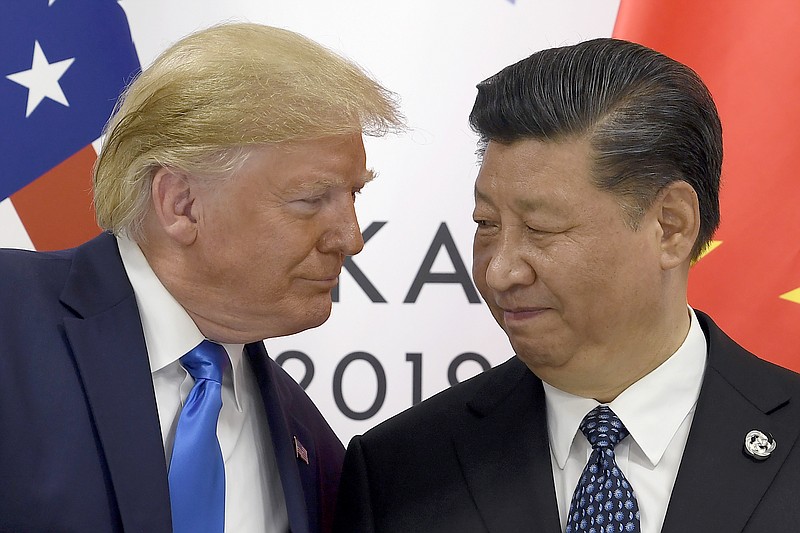It is impossible to exaggerate what a dangerous cliff the U.S. and China are perched on today.
If the current trade dispute tips over into a full-blown economic war the world as we've known it for the last four decades is going to be replaced with something much uglier, less prosperous, less stable and less able to meet global challenges, like climate change and cybercrime, that are barreling down on us.
This has become a really bad play. We have a juvenile, unstable U.S. president actually enacting trade policy via Twitter and we have a pressured Chinese president who is afraid to appear to be kowtowing to any trade demands from the U.S. for fear that his domestic rivals will denounce him as weak and that pro-democracy demonstrators in Hong Kong will be emboldened by his weakness.
So each man is trying to intimidate the other into submission by showing who has the biggest tariff, and this is whipsawing markets and making it impossible for investors to plan long term.
We need a cease-fire now - and if no one else is going to propose the terms, I will.
President Donald Trump should say to President Xi Jinping: "For the next six months, we'll suspend all the tariffs that we've imposed. And we expect you to order from the top down an end to your worst trade abuses: stealing intellectual property, forcing technology transfers, restricting access, etc. You don't have to announce anything or put anything into law. Just get it done your own way and tell your people whatever you want. I won't tweet a word to embarrass you. And we'll re-evaluate in six months whether the results constitute meaningful progress."
That's not a perfect outcome after two years of negotiations, but perfect is not on the menu. Don't get me wrong, Trump was right to insist that the U.S.-China trading relationship had to change. But Trump vastly underestimated in several ways how "easy" winning a trade war with China would be.
Trump, by doing the whole thing in public clearly prompted the Chinese to remind the U.S. president that they're not some dumpling restaurant in a Trump Tower that can be bullied into paying more rent. They're actually one-sixth of humanity, and they hold more than $1.1 trillion in U.S. Treasury bills, notes and bonds, which is 27% of all the U.S. government debt held by foreign countries, and they're pretty good at making stuff.
For instance, it takes about 22 hours on Amtrak to go by train from New York to Chicago. Beijing to Shanghai is about the same distance, and it takes China's bullet train 4.5 hours to make that trip. That's not a typo. And it partly explains why a lot of Chinese officials look at America today as a dysfunctional mess that elected a crazy man as president and that can't build anything big and hard anymore because it can't act together.
Also, while I respect the comprehensive approach Trump's actual trade negotiators took in these talks - they wanted China to enact laws and regulations that would outlaw stealing of intellectual property, forced technology transfers, certain government subsidies, and to create a U.S.-China mechanism to verify compliance - it might have been too much change all at once for the Chinese system. That's not an excuse for Beijing. It's just a fact.
What Trump also underestimated is that we don't just have a trade access problem with China today, we also have a trust shortage problem. When all we bought from China were toys and T-shirts and cheap electronics, we did not care if they were communists, capitalists, authoritarians or vegetarians. But now that China wants to sell us many of the same high-tech products that America and Europe make - from 5G infrastructure to cellphones to advanced electronics - products that get deeply embedded in our society and can be dual use (civilian and military), we need a whole new level of trust between our societies. That will take time to build.
Xi, for his part, completely misread how much Republicans, Democrats and the broad U.S. business community are behind Trump's unwillingness to tolerate China's trade abuses any longer - not when China wants to make and export all the same products that we do. If Xi thinks Americans will continue to tolerate the status quo in U.S.-China trade, he is badly mistaken.
So for all these reasons it's best to go right now for a truce and a period of confidence-building, during which China proves that it really will open up and Trump proves to China that all he wants are results he can brag about - not a revolution in Beijing.
While those six months play out, Trump should sign the Trans-Pacific Partnership deal - which brings the 12 biggest Pacific economies, except China, into a global Pacific trade pact built around American values and standards - and then line up all our European Union allies, as well.
That way when we revisit this issue in six months, we can present China with a united front to formalize its trade openings. By then it won't be Trump versus Xi, but rather the world versus China over what are the best reciprocal rules for trade for all. That should be our goal, maneuvering China into a rules-based global competition.
If Trump and Xi can forge a big deal right now, God bless them. I'll tip my cap. I'd be happy making some real trade progress now, lowering the temperature so we can have a more rational, long-term discussion about rules and avoiding a new Cold War with China that will destabilize the whole globalization system - a system that's also not perfect but, boy, you will miss it if it's gone.
The New York Times
